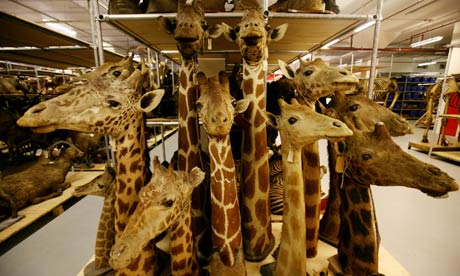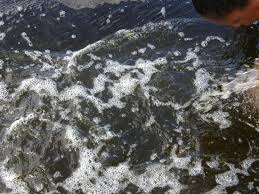 For the first time since the dinosaurs disappeared, humans are driving animals and plants to extinction faster than new species can evolve, one of the world's experts on biodiversity has warned.
For the first time since the dinosaurs disappeared, humans are driving animals and plants to extinction faster than new species can evolve, one of the world's experts on biodiversity has warned.
Conservation experts have already signalled that the world is in the grip of the "sixth great extinction" of species, driven by the destruction of natural habitats, hunting, the spread of alien predators and disease, and climate change.
TVNL Comment: Humans have behaved like a deadly virus on this planet. We destroy everything and anything and we leave behind a planet that can not sustain life.

 Environmental News Archive
Environmental News Archive


 A coalition of communities in six Midwestern states filed a federal lawsuit Monday seeking to force the manufacturer of a widely-used herbicide to pay for its removal from drinking water.
A coalition of communities in six Midwestern states filed a federal lawsuit Monday seeking to force the manufacturer of a widely-used herbicide to pay for its removal from drinking water. A mysterious problem that causes bee colonies to decline is once again taking its toll on the state's beekeepers. The problem known as colony collapse disorder is characterized by a sudden drop in a bee colony's population and the inexplicable absence of dead bees.
A mysterious problem that causes bee colonies to decline is once again taking its toll on the state's beekeepers. The problem known as colony collapse disorder is characterized by a sudden drop in a bee colony's population and the inexplicable absence of dead bees. Lower levels of oxygen in the Earth's oceans, particularly off the United States' Pacific Northwest coast, could be another sign of fundamental changes linked to global climate change, scientists say. They warn that the oceans' complex undersea ecosystems and fragile food chains could be disrupted.
Lower levels of oxygen in the Earth's oceans, particularly off the United States' Pacific Northwest coast, could be another sign of fundamental changes linked to global climate change, scientists say. They warn that the oceans' complex undersea ecosystems and fragile food chains could be disrupted. Climate scientists have delivered a powerful riposte to their sceptical critics with a study that strengthens the case for saying global warming
Climate scientists have delivered a powerful riposte to their sceptical critics with a study that strengthens the case for saying global warming Large amounts of a powerful greenhouse gas are bubbling up from a long-frozen seabed north of Siberia, raising fears of far bigger leaks that could stoke global warming, scientists said.
Large amounts of a powerful greenhouse gas are bubbling up from a long-frozen seabed north of Siberia, raising fears of far bigger leaks that could stoke global warming, scientists said. The U.S. government announced Wednesday that it supports prohibiting international trade of Atlantic bluefin tuna, a move that could lead to the most sweeping trade restrictions ever imposed on the highly prized fish.
The U.S. government announced Wednesday that it supports prohibiting international trade of Atlantic bluefin tuna, a move that could lead to the most sweeping trade restrictions ever imposed on the highly prized fish.
 Thousands of the nation’s largest water polluters are outside the Clean Water Act’s reach because the Supreme Court has left uncertain which waterways are protected by that law, according to interviews with regulators. As a result, some businesses are declaring that the law no longer applies to them. And pollution rates are rising.
Thousands of the nation’s largest water polluters are outside the Clean Water Act’s reach because the Supreme Court has left uncertain which waterways are protected by that law, according to interviews with regulators. As a result, some businesses are declaring that the law no longer applies to them. And pollution rates are rising.






























